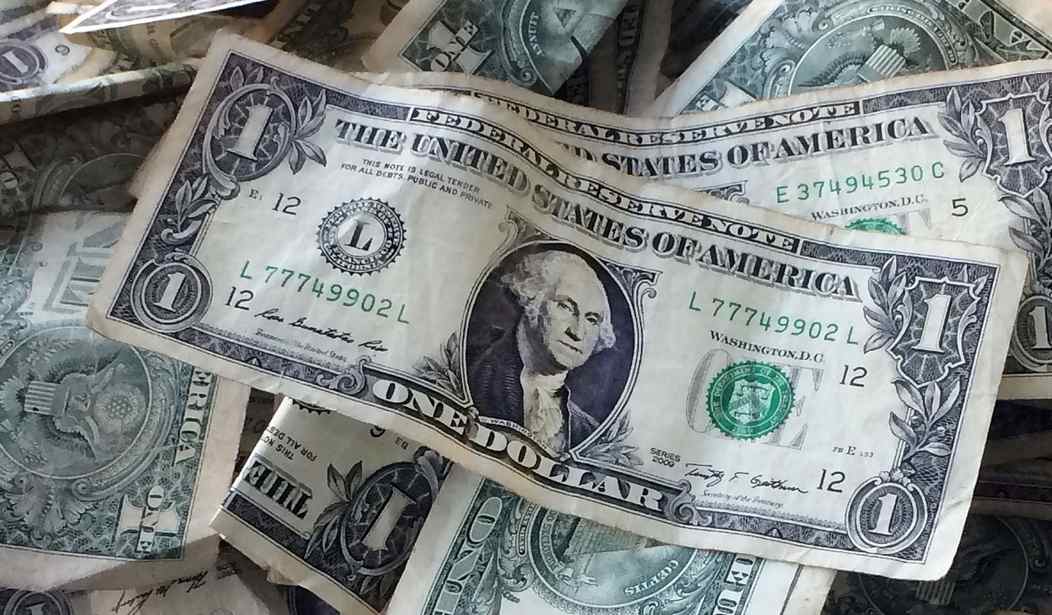By Lawrence Kudlow, Arthur B. Laffer, and Stephen Moore
The Trump Administration and the Republicans in Congress have passed one of the best pro-growth tax bills ever. The Tax Cuts and Jobs Act ranks in the all-time hall of fame along with Reagan's 1981 and 1986 Tax Acts and President Kennedy’s posthumous tax cuts of 1964. The announcements by Apple, FedEx, ATT, Fiat Chrysler and over 300 companies with multi-billion dollar investments in the United States are early lead indicators of good things to come from the tax rate cuts.
When this is combined with Trump's deregulation agenda, we see no reason why the economy cannot grow for a sustained period at 3 to 4 percent growth - up from 1.6 percent in Obama's last year.
But there is still a missing pillar of prosperity in the Trump economic agenda and that is a sound dollar strategy. The dollar weakened in 2017 and we want it stabilized. There’s little in this world that can bring our economy to its knees faster than a weak dollar in the foreign exchange markets. Just ask people who served in the Nixon, Ford, Carter, Bush 2 administrations and Barack Obama’s first term - all of which were undone by a weak and depreciating dollar, surging inflation, spiking interest rates, plus financial or commodity bubbles.
Meanwhile, under Reagan the U.S. dollar increased by 67% in value in the foreign exchange markets through 1985. The price of gold, interest rates, and inflation all fell as well from their double-digit inflationary highs, while the American economy reignited and the stock market launched its 18 year bull market.
Or go back further in time. In May of 1962, President Kennedy’s Revenue Act was passed and President Kennedy reaffirmed that the U.S. dollar was as good as gold thus launching the incredible boom called the ‘Go-Go Sixties’. A strong dollar is an essential pillar of economic prosperity with minimal inflation, but we worry that the White House has not adopted this strategy. So we urge the Trump administration to return to the successful King Dollar policies that worked in the 60’s, 80’s and 90’s.
Recommended
Devaluations and weak currencies do not create U.S. jobs. Instead, weakened currencies are accompanied by relative price changes leading to inflation in the devaluing country. (Americans can by definition buy less with weak dollars in their wallets than strong dollars.)
The stock market's big sell-off last week, coming after a weak dollar and rising gold and commodity prices, may well have stirred inflation fears and higher bond yields, coming on top of a healthy rise in real rates from a growing economy. But the dollar has still not strengthened, perhaps because the administration initially fumbled the ball in Davos.
We also worry that the recent widening trade deficit numbers will further tempt the Administration into a weak dollar strategy. The trade gap - imports over exports - widened by 12 percent last year to $566 billion. This was the highest level since 2008. But the widening trade deficit is actually a symptom of Trump's pro-growth tax and deregulation policies that are working. The last time the trade deficit fell sharply was in 2009 and 2010 because of the steep recession.
Trump was right when he once acknowledged the irony that his pro-growth tax and deregulation policies are partly responsible for the higher dollar that he seems not to want. But in fact, trade deficits are nothing more than the flip side of large capitals inflows from around the world. This is a good thing. Before long, the trade gap will narrow, as the US becomes more competitive and the most hospitable investment environment in the world.
A return to King Dollar will bring a lot more jobs, wage increases, and investment flows back into the United States. It will confirm that, as Mr. Trump told the world's leaders and CEOs in Davos, Switzerland, "America is open for business again."
Looking forward, the administration should speak of a sound, stable, strong dollar. A great country must have a reliable currency.
Additionally, if the dollar continues to trend lower, then the Fed should step in to retire reserves and withdraw excess money.
That leaves us with lower tax rates, strong growth, and a low inflation prosperity.
And, if history is any guide, it raises the probability that President Trump gets reelected in a landslide.
Laffer, Kudlow and Moore are co-founders of the Committee to Unleash Prosperity.

























Join the conversation as a VIP Member